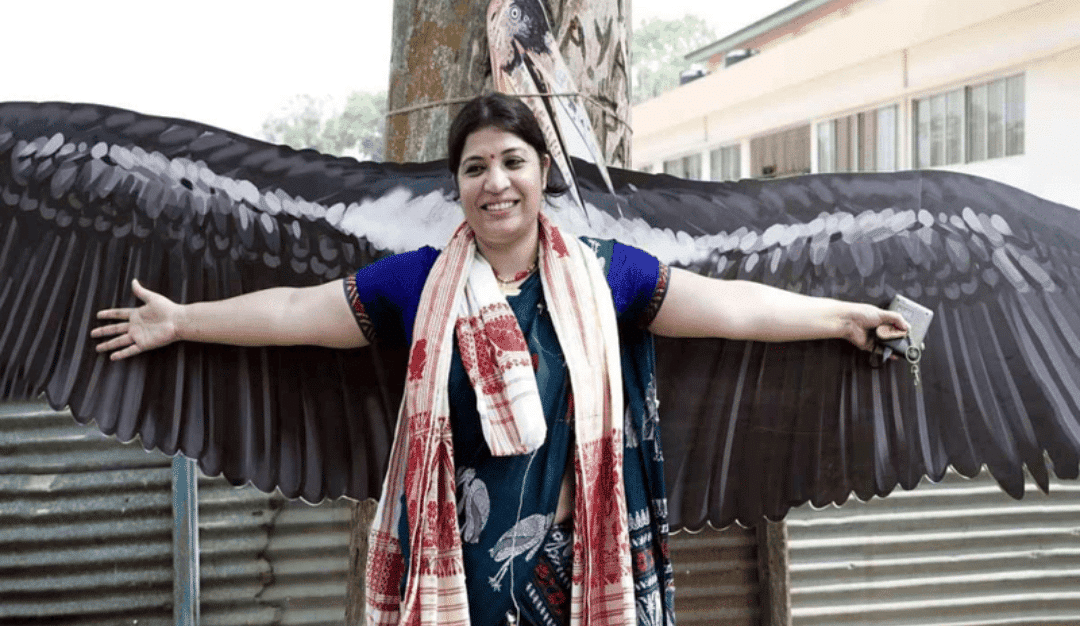Purnima Devi Barman has achieved a groundbreaking milestone by becoming the only Indian woman featured in TIME’s Women of the Year 2025 list. A staunch environmentalist and wildlife conservationist, she is widely recognized for her tireless efforts in protecting the greater adjutant stork—an endangered bird species once on the brink of extinction.
However, Barman’s work extends far beyond conservation. Through her initiative, she has successfully mobilized over 20,000 rural women, turning them into community guardians of nature. Her unique approach of integrating wildlife conservation with women’s empowerment and cultural revival has led to widespread impact, transforming the way communities engage with endangered species.
Reviving the Greater Adjutant Stork from the Brink of Extinction
The greater adjutant stork (Leptoptilos dubius), locally called ‘Hargila’, was once abundant in the wetlands of Assam. However, due to habitat destruction, urbanization, and superstitious beliefs, their population dwindled to alarming levels.
Challenges the Stork Faced
- Negative Superstitions: Many locals viewed the stork as a sign of bad luck and treated it with hostility, often destroying its nests.
- Habitat Loss: Rapid deforestation and shrinking wetlands left the birds with limited places to breed.
- Poaching & Human Conflict: Nesting trees were frequently cut down, and the birds faced neglect and threats from human settlements.
Despite these hurdles, Barman’s commitment to the storks never wavered. Her conservation journey began in 2007 when she encountered a group of villagers cutting down a tree filled with Hargila nests. Witnessing the helpless chicks fall to the ground deeply moved her, igniting a mission that would later become a full-scale grassroots movement.
Through education, cultural integration, and active community participation, she successfully rebranded the Hargila from a despised scavenger to a symbol of pride and ecological importance.
The Impact of Her Conservation Efforts
✅ Over 1,800 greater adjutant storks now thrive in Assam—a massive increase from the critically low numbers in the early 2000s.
✅ Nesting trees are now celebrated and protected instead of being cut down.
✅ Increased awareness among communities has led to a shift in perception, with locals embracing their role as conservationists.
The Rise of the ‘Hargila Army’: A Women-Led Conservation Movement
Understanding that lasting change required community involvement, Barman took an innovative approach—she turned women into environmental warriors.
How She Built the ‘Hargila Army’
👩 Mobilized 20,000+ rural women in Assam to protect nesting sites and rescue birds.
🧵 Introduced sustainable livelihood programs by training women to make traditional handloom products and handicrafts featuring Hargila motifs.
📚 Integrated conservation into local traditions through storytelling, songs, and festivals celebrating the stork.
Barman’s movement was revolutionary because it didn’t just save the bird—it empowered women with new economic opportunities and gave them an active role in environmental conservation. Today, the ‘Hargila Army’ is a globally recognized grassroots model for conservation.
Global Recognition and Prestigious Awards
Barman’s dedication to wildlife and women’s empowerment has not gone unnoticed. Over the years, she has received several prestigious accolades, including:
🏅 Nari Shakti Puraskar (2017) – India’s highest civilian honor for women.
🌍 UNEP Champions of the Earth Award (2022) – The UN’s highest environmental honor.
🏆 TIME’s Women of the Year (2025) – Recognized for her role in conservation and social change.
Her work has set a precedent for conservationists worldwide, proving that wildlife protection and social empowerment can go hand in hand.
The Legacy of Purnima Devi Barman: A Call to Action
Purnima Devi Barman’s story is more than just one of conservation—it’s a testament to the power of grassroots activism, community-driven change, and the incredible impact one person can have on an entire ecosystem.
Her journey serves as an inspiration for future environmentalists, conservationists, and women leaders. She has redefined conservation by turning an endangered species into a community treasure, proving that when people come together, even the most vulnerable creatures can be saved.
As she continues her mission, one thing is certain: Purnima Devi Barman’s legacy will inspire generations to come.



